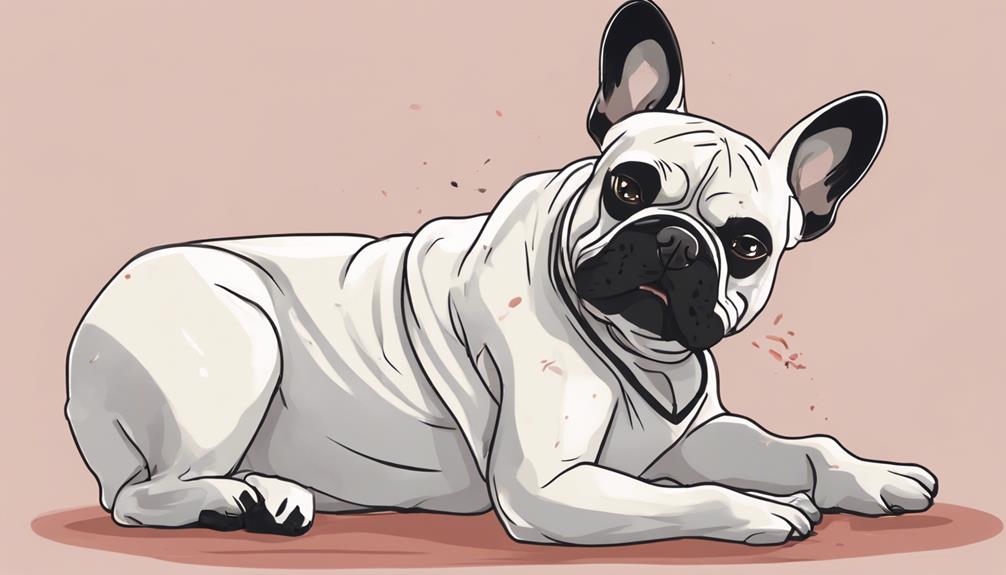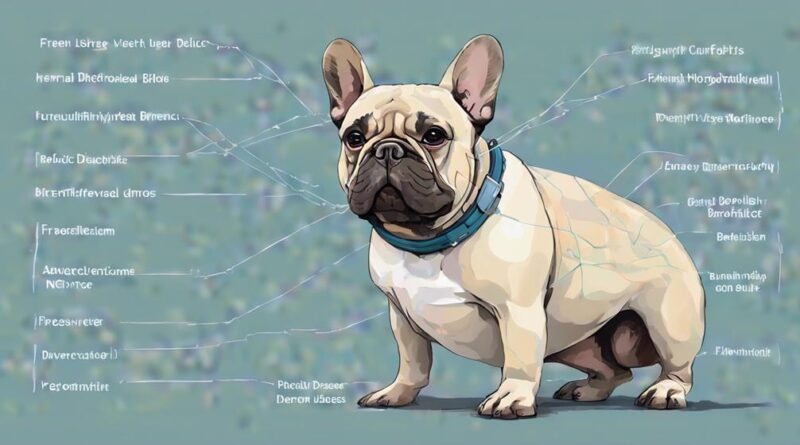9 Best Known Neurological Disorders in French Bulldogs
As a French Bulldog owner, knowing the top 9 neurological disorders is crucial. Look out for Brachycephalic Syndrome, related to their unique skull shape, contributing to respiratory issues. Hydrocephalus manifests as abnormal fluid accumulation in the brain, leading to symptoms like seizures and vision problems. Epilepsy, triggered by various factors, requires medication and monitoring by a vet. Narcolepsy causes sudden sleepiness bouts needing medications and behavioral adjustments. Discover more about Intervertebral Disc Disease, Degenerative Myelopathy, Meningitis, Muscular Dystrophy, and Congenital Myasthenic Syndrome to safeguard your furry friend's health.
Brachycephalic Syndrome
If you own a French Bulldog, understanding the implications of Brachycephalic Syndrome is crucial for their well-being. This condition is prevalent in brachycephalic breeds due to their unique skull shape, which can lead to respiratory complications. French Bulldogs, with their characteristic flat faces and narrowed nostrils, are particularly susceptible to this syndrome. The respiratory issues associated with Brachycephalic Syndrome can range from mild to severe, impacting your dog's quality of life.
Surgical interventions may be necessary in severe cases to alleviate the respiratory distress caused by Brachycephalic Syndrome. These procedures aim to widen the airways and improve airflow, ultimately enhancing your French Bulldog's breathing capabilities. However, surgery should always be considered a last resort, with preventive measures and careful breeding considerations taking precedence.
When it comes to breeding French Bulldogs, it's essential to prioritize the health and well-being of the offspring. Selecting breeding pairs with less severe brachycephalic features can help reduce the risk of passing on this syndrome to future generations. Additionally, responsible breeders should be vigilant in monitoring for signs of respiratory distress in puppies and adult dogs, seeking veterinary care promptly if any issues arise. By taking these preventive measures and making informed breeding choices, you can help mitigate the impact of Brachycephalic Syndrome in French Bulldogs.
Intervertebral Disc Disease
Intervertebral Disc Disease in French Bulldogs presents a significant concern due to the breed's susceptibility to spinal issues. This condition occurs when the discs between the vertebrae degenerate or become herniated, leading to pain, nerve damage, and in severe cases, paralysis. When addressing this disorder in French Bulldogs, understanding the treatment options is crucial.
In cases of Intervertebral Disc Disease, treatment options vary depending on the severity of the condition. Non-surgical approaches like strict rest, anti-inflammatory medications, and physical therapy can be effective for mild cases. However, if the symptoms are severe or progressive, surgical intervention may be necessary. Surgical procedures aim to alleviate pressure on the spinal cord and nerves, often resulting in better outcomes for affected French Bulldogs.
Prognosis and long-term management strategies play a vital role in the recovery and well-being of French Bulldogs with Intervertebral Disc Disease. The prognosis can vary based on factors such as the location and extent of the disc damage, as well as the timeliness of intervention. Long-term management may involve weight management, physical rehabilitation, and ongoing monitoring to prevent recurrence or worsening of symptoms.
Epilepsy
French Bulldogs with a history of neurological issues, such as Intervertebral Disc Disease, may also be prone to developing epilepsy, a neurological disorder characterized by recurrent seizures. Seizures in French Bulldogs can be triggered by various factors including stress, excitement, changes in routine, or even certain foods. It's crucial to identify these triggers to help manage and reduce the frequency of seizures in affected dogs.
When it comes to epilepsy management in French Bulldogs, medication is often the primary course of action. Your veterinarian may prescribe antiepileptic drugs to help control and prevent seizures. It's essential to follow the prescribed dosage and schedule meticulously to ensure the effectiveness of the medication. Regular check-ups with your vet will also be necessary to monitor your dog's response to the treatment and make any necessary adjustments.
In addition to medication, maintaining a consistent routine, minimizing stress, and providing a safe environment for your French Bulldog can also aid in managing epilepsy. Remember to keep a seizure diary to track episodes, triggers, and response to medication. This information can be invaluable for you and your veterinarian in fine-tuning the treatment plan for your furry friend.
Hydrocephalus
Hydrocephalus, a condition characterized by an abnormal accumulation of cerebrospinal fluid within the brain, can affect French Bulldogs predisposed to neurological disorders. This condition can arise due to various factors such as congenital malformations, tumors, or infections. In French Bulldogs, hydrocephalus may manifest through symptoms like an enlarged head, seizures, vision problems, and changes in behavior.
Diagnosis of hydrocephalus in French Bulldogs typically involves imaging studies like magnetic resonance imaging (MRI) or computed tomography (CT) scans to visualize the brain and assess the extent of fluid accumulation. Once diagnosed, treatment options for hydrocephalus in French Bulldogs may include medications to reduce fluid production, surgical intervention to create an alternative pathway for the cerebrospinal fluid to drain, or the placement of a shunt to redirect the excess fluid away from the brain.
The prognosis for French Bulldogs with hydrocephalus can vary depending on the severity of the condition and the response to treatment. While some dogs may show improvement with treatment and management, others may have a more guarded prognosis. It's essential for owners of French Bulldogs diagnosed with hydrocephalus to work closely with their veterinarian or a veterinary neurologist to determine the most appropriate treatment plan and provide the best possible care for their furry companion.
Degenerative Myelopathy
Degenerative Myelopathy, a progressive neurological disease affecting the spinal cord in certain dog breeds, is characterized by the degeneration of the white matter. This condition is commonly seen in French Bulldogs and can lead to mobility issues and hind limb weakness. Early detection of degenerative myelopathy is crucial for managing the disease effectively. Veterinarians often rely on a combination of clinical signs, neurological examinations, and genetic testing to diagnose this condition in its early stages.
When it comes to treatment options for degenerative myelopathy in French Bulldogs, unfortunately, there's no cure for this disease. However, there are various strategies aimed at slowing down its progression and improving the quality of life for affected dogs. Physical therapy, exercise regimens, and mobility aids like wheelchairs can help dogs with degenerative myelopathy maintain their strength and mobility for longer periods.
In addition to physical interventions, dietary supplements and medications may also be prescribed to manage symptoms and support nerve function. It's essential for dog owners to work closely with their veterinarians to develop a comprehensive treatment plan tailored to their French Bulldog's specific needs. By focusing on early detection and implementing appropriate treatment strategies, it's possible to enhance the well-being and comfort of French Bulldogs affected by degenerative myelopathy.
Meningitis
Early detection and appropriate treatment are crucial in managing meningitis, a serious neurological condition that can affect French Bulldogs. Meningitis is characterized by the inflammation of the protective membranes covering the brain and spinal cord. Prevention of meningitis in French Bulldogs involves maintaining good overall health through regular veterinary check-ups, vaccinations, and a clean environment to reduce the risk of infections that can lead to meningitis.
If your French Bulldog is diagnosed with meningitis, it's essential to work closely with your veterinarian to determine the best treatment options. Treatment may include antibiotics to combat bacterial infections, anti-inflammatory medications to reduce swelling, and pain management to alleviate discomfort. In severe cases, hospitalization and supportive care may be necessary.
The impact of meningitis on a French Bulldog's quality of life can be significant. Dogs suffering from meningitis may experience symptoms such as fever, neck pain, seizures, and behavioral changes. The condition can cause discomfort and affect your dog's mobility and overall well-being. With prompt diagnosis and appropriate treatment, many French Bulldogs can recover from meningitis and resume a good quality of life. Regular monitoring and follow-up care are essential to manage the condition effectively and minimize the risk of recurrence.
Narcolepsy

Narcolepsy in French Bulldogs can manifest as sudden and uncontrollable episodes of sleepiness, impacting their daily functioning and quality of life. This neurological disorder disrupts the normal sleep-wake cycle, causing affected dogs to experience excessive daytime sleepiness, sudden muscle weakness (cataplexy), hallucinations, and sleep paralysis. The impact of narcolepsy on a French Bulldog's quality of life can be significant, leading to difficulties in engaging in regular activities, training, and overall well-being.
When it comes to treatment options for narcolepsy in French Bulldogs, research advancements have led to various strategies to manage the condition. Medications such as stimulants to combat sleepiness and antidepressants to control cataplexy may be prescribed by veterinarians to help regulate the symptoms. Behavioral modifications, such as establishing a consistent sleep schedule and providing regular exercise, can also aid in managing narcolepsy in French Bulldogs.
Despite the challenges posed by narcolepsy, advancements in research and treatment options have provided hope for affected French Bulldogs. By working closely with veterinarians and implementing a tailored treatment plan, owners can help their furry companions lead a more comfortable and fulfilling life despite this neurological disorder.
Muscular Dystrophy
Muscular dystrophy in French Bulldogs presents as a progressive weakening of muscle mass and function, impacting their mobility and overall physical health. This genetic disorder is characterized by a mutation in the dog's DNA that affects the production of proteins essential for muscle strength. As a French Bulldog owner, understanding the implications of this condition is crucial for your pup's well-being.
Genetic testing plays a vital role in diagnosing muscular dystrophy in French Bulldogs. By identifying the specific genetic mutation causing the disorder, veterinarians can provide targeted treatment and management strategies. Early detection through genetic testing can also help in developing a personalized care plan to support your furry friend's quality of life.
In addition to genetic testing, physical therapy is a key component in managing muscular dystrophy in French Bulldogs. A tailored exercise regimen can help maintain muscle function, improve mobility, and slow down the progression of the disease. Physical therapy sessions, guided by professionals experienced in canine rehabilitation, can significantly benefit your French Bulldog's muscle strength and overall physical health.
As a responsible pet owner, staying informed about muscular dystrophy and actively participating in your French Bulldog's care, including genetic testing and physical therapy, can make a positive impact on their quality of life. By working closely with your veterinarian, you can ensure that your beloved companion receives the best possible support in managing this challenging condition.
Congenital Myasthenic Syndrome

Congenital Myasthenic Syndrome in French Bulldogs is a neuromuscular disorder that affects the communication between nerves and muscles. This condition is caused by genetic mutations that result in abnormal neuromuscular transmission. Symptoms of Congenital Myasthenic Syndrome in French Bulldogs include muscle weakness, exercise intolerance, difficulty swallowing, and respiratory distress. These signs typically manifest within the first few months of life.
Diagnostic tests are crucial in identifying Congenital Myasthenic Syndrome in French Bulldogs. Veterinarians may conduct electromyography (EMG) studies to assess muscle function and nerve stimulation. Genetic testing can also confirm the presence of specific mutations associated with this syndrome.
When it comes to treatment options for Congenital Myasthenic Syndrome in French Bulldogs, management focuses on alleviating symptoms and improving the quality of life for the affected dogs. Medications such as acetylcholinesterase inhibitors can help enhance neuromuscular transmission. In severe cases, supportive care like feeding tubes or assisted ventilation may be necessary.
Genetic inheritance plays a significant role in Congenital Myasthenic Syndrome, and affected French Bulldogs shouldn't be bred to prevent passing on the genetic mutation. Understanding the symptoms, diagnostic tests, and treatment options for this condition is essential for providing the best care for French Bulldogs diagnosed with Congenital Myasthenic Syndrome.
Frequently Asked Questions
Are French Bulldogs More Prone to Neurological Disorders Than Other Breeds?
French Bulldogs aren't inherently more prone to neurological disorders than other breeds. However, genetic testing before breeding can help reduce the risk.
Additionally, ensuring a balanced diet and regular exercise routine can support overall neurological health in French Bulldogs.
Can Neurological Disorders in French Bulldogs Be Prevented Through Breeding Practices?
To prevent neurological disorders in French Bulldogs through breeding practices, focus on breeding ethics and genetic testing. By selecting mating pairs carefully and testing for known genetic markers, you can reduce the risk of passing on predispositions to these disorders.
Additionally, consider incorporating behavioral therapy and alternative medicine into the care of affected dogs to manage symptoms and improve their quality of life. This comprehensive approach can help mitigate the impact of neurological disorders in French Bulldogs.
What Are the Common Early Signs of Neurological Disorders in French Bulldogs?
If you notice behavioral changes like tremors, seizures, or coordination issues in your French Bulldog, it could indicate a neurological disorder. Early intervention is crucial for managing these conditions.
Due to their genetic predisposition, Frenchies are prone to such issues, but diagnosing them can be challenging. Keep a close eye on any unusual symptoms and consult a vet promptly for proper evaluation and treatment.
Your vigilance can make a difference in your pup's well-being.
Are There Any Specific Environmental Factors That Can Trigger Neurological Disorders in French Bulldogs?
When it comes to triggering neurological disorders in French Bulldogs, genetic predisposition plays a significant role. Additionally, dietary influences can also contribute to the development of these conditions.
It's essential to be mindful of these factors to help support your furry friend's neurological health. Keeping a close eye on their genetics and ensuring they've a balanced diet can help minimize the risk of neurological disorders in French Bulldogs.
How Effective Are Treatment Options for Neurological Disorders in French Bulldogs?
Treatment effectiveness for neurological disorders in French Bulldogs varies depending on the specific condition. Some disorders may respond well to traditional treatments like medications and physical therapy, leading to improved long-term outcomes.
However, alternative therapies and holistic approaches, such as acupuncture or dietary changes, have also shown promise in managing certain neurological issues. It's essential to work closely with your veterinarian to determine the most effective treatment plan for your furry companion.
Conclusion
In conclusion, French Bulldogs are susceptible to a variety of neurological disorders that can impact their quality of life. From Brachycephalic Syndrome to Degenerative Myelopathy, these conditions require proper management and care from their owners.
Being aware of the signs and symptoms of these disorders is crucial in ensuring the well-being of these beloved pets. Regular vet check-ups and early intervention can help in managing these neurological disorders and providing a better life for French Bulldogs.
